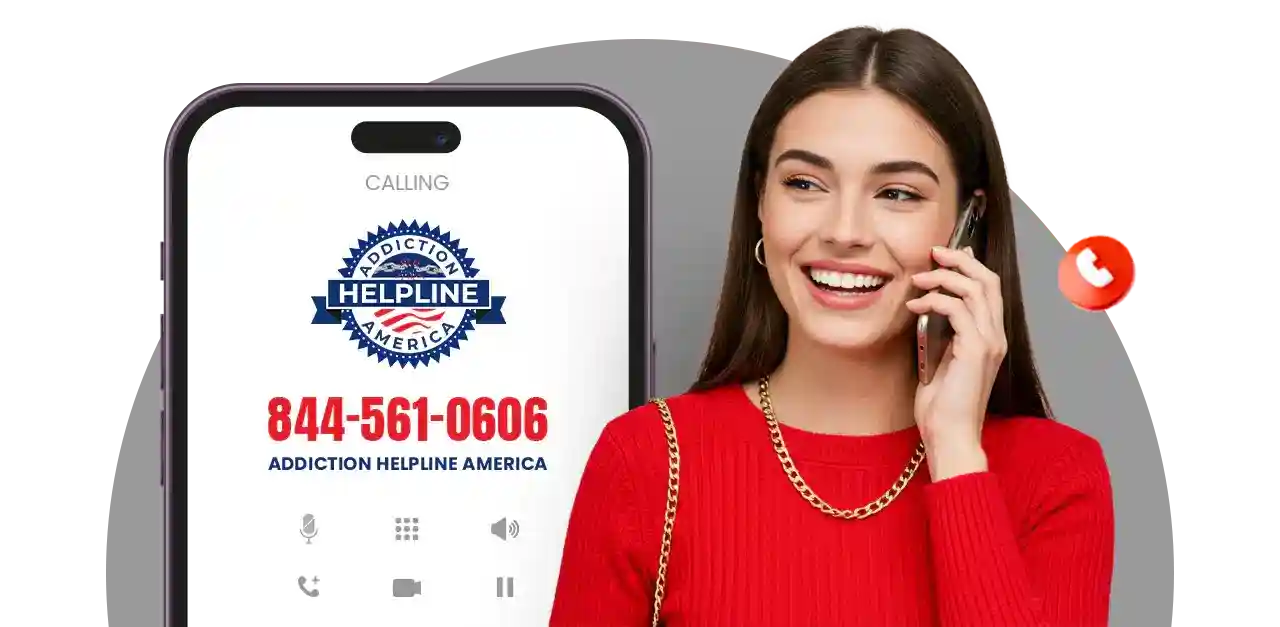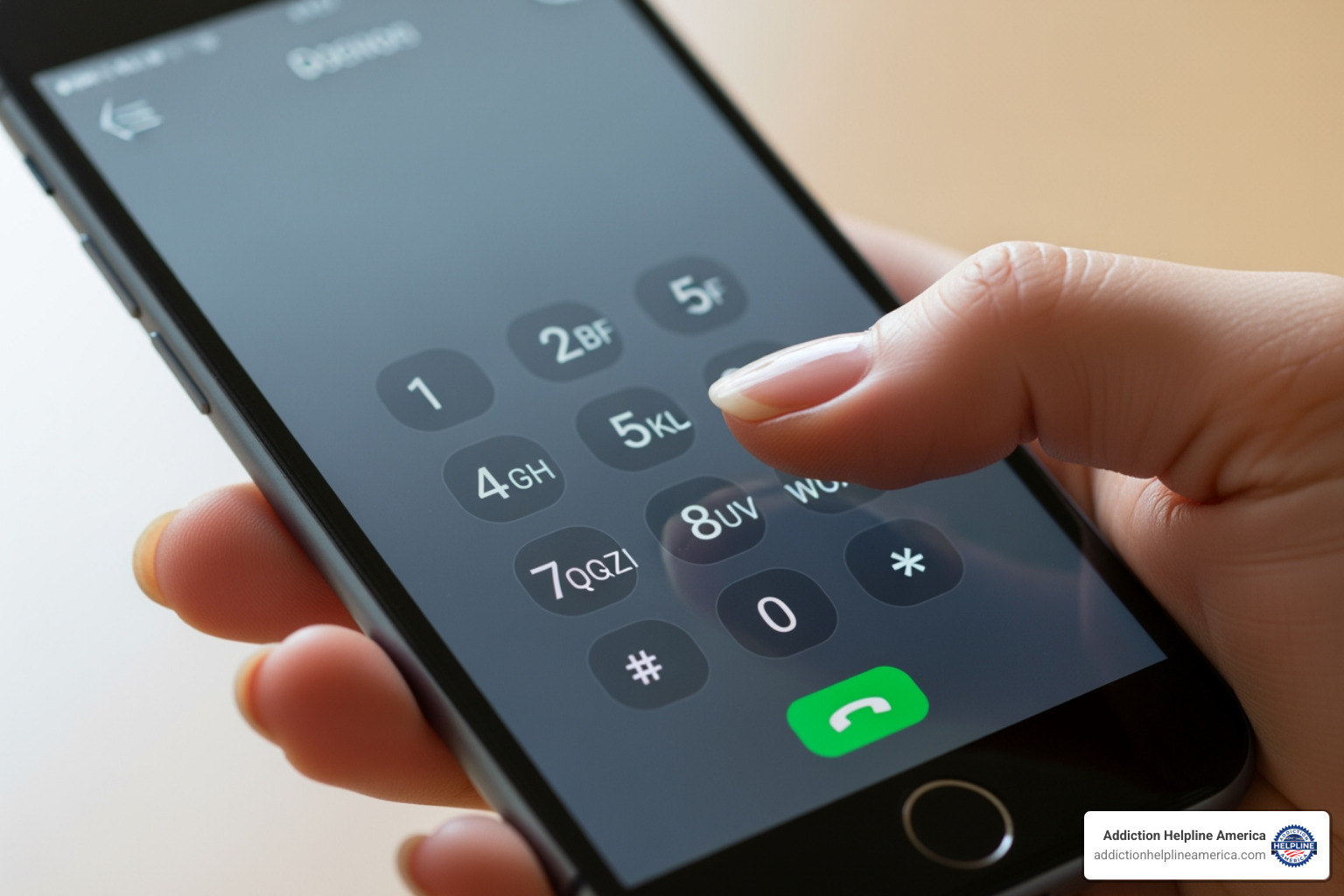
Why Immediate Mental Health Support Matters When Crisis Strikes
A 24 hour mental health helpline provides free, confidential support for anyone facing a mental health or substance use crisis. Available 24/7/365, these services connect you with trained counselors for immediate emotional support, crisis intervention, and treatment referrals—anonymously and without judgment.
Quick Access to Key Helplines:
- 988 Suicide & Crisis Lifeline: Call or text 988
- SAMHSA National Helpline: 1-800-662-HELP (4357) for treatment referrals
- Crisis Text Line: Text “HELLO” to 741741
- NAMI HelpLine: 1-800-950-NAMI (6264), Monday-Friday 10 AM – 10 PM ET
- Addiction Helpline America: Available to connect you with treatment options
Mental health crises don’t follow a schedule. Since its launch, the 988 Lifeline alone has answered over 13 million contacts, and studies show that callers feel less suicidal, depressed, and overwhelmed after speaking with a counselor. These helplines offer active listening, safety planning, and connections to local resources, serving as a critical lifeline for individuals and their loved ones. They are proven to de-escalate crises, with fewer than 2% of calls to some crisis lines resulting in emergency room visits.
At Addiction Helpline America, we understand the urgency of a mental health or addiction crisis. Our team has helped thousands by connecting them to comprehensive treatment options and compassionate guidance through our 24 hour mental health helpline services.
What is a 24-Hour Mental Health Helpline and Who Is It For?
A 24 hour mental health helpline is a free, confidential service providing immediate support for emotional distress or crisis, day or night. It’s a lifeline for anyone struggling with difficult emotions, suicidal thoughts, mental health conditions, or substance use concerns.
Trained counselors provide crisis intervention, a non-judgmental listening ear, and referrals to local mental health services. For those with suicidal thoughts, they collaborate on a safety plan to steer the immediate crisis. Many helplines also address substance use concerns, offering support and referrals for addiction treatment. Our Understanding Alcohol Addiction Guide offers more insight.
These services are for everyone. There are no eligibility requirements, insurance needs, or costs. Whether you’re a teen with anxiety, an adult with depression, or a family member worried about a loved one, help is available.
How Helplines Differ from Emergency Services and Other Support Options
It’s important to know when to call a helpline versus 911. The table below clarifies their distinct roles.
| Feature | Emergency Services (e.g., 911) | Urgent Mental/Emotional Crisis Helplines (e.g., 988) | Addiction Helpline America’s Support Lines |
|---|---|---|---|
| Primary Focus | Immediate physical danger, medical emergencies, crimes | Mental health, suicidal crisis, emotional distress, substance use crisis | Connecting individuals to addiction and mental health treatment centers |
| When to Call | Life-threatening situations, active violence, medical emergencies | Suicidal thoughts, severe emotional distress, panic attacks, substance use crisis (non-life-threatening) | Seeking information on treatment, understanding options, finding a rehab program |
| Response | Police, fire, ambulance dispatch | Trained crisis counselors (phone, text, chat), potential mobile crisis teams | Personalized guidance, treatment referrals, insurance verification |
| Confidentiality | Limited (information shared with responders) | High (often anonymous, information not shared without consent, unless safety is at risk) | High (confidential discussions to find the right program) |
| Intervention Level | Direct, physical intervention, transport to ER | Verbal de-escalation, safety planning, resource connection, crisis follow-up | Assessment of needs, matching to suitable treatment programs from a vast network |
| Follow-up | Medical care, legal process | Referrals to ongoing care, crisis follow-up, relapse prevention services | Ongoing support through the referral process, connecting with treatment admissions |
The 988 Suicide & Crisis Lifeline provides a mental health response from trained counselors, often avoiding the need for a police response. At Addiction Helpline America, we provide a different but vital service: connecting you to the right recovery program from our network of treatment centers. Learn more on our More about Support Lines page.
Situations and Concerns That Warrant a Call
If you’re struggling, it’s serious enough to call. 24 hour mental health helplines are for a wide range of concerns, including:
- Suicidal thoughts or self-harm urges, even without a specific plan.
- Overwhelming anxiety or depression that disrupts your daily life.
- Panic attacks and the intense fear they cause.
- Substance abuse concerns, such as difficulty controlling use or experiencing withdrawal. (For a life-threatening overdose, call 911 immediately.) Our Signs of Alcohol Addiction guide can help identify warning signs.
- Trauma or PTSD flashbacks and distress.
- Feeling hopeless, isolated, or overwhelmed by grief, loss, or relationship problems.
- Worrying about a friend or family member and needing advice on how to support them.
The Role of 24 Hour Mental Health Helplines and What to Expect
24 hour mental health helplines create a national safety net. National helplines like 988 ensure anyone in the U.S. can get immediate support, while local crisis lines connect you to resources in your own community.
A core promise is confidentiality. Your conversation is private, and you can often remain anonymous. This creates a safe, judgment-free space to be honest about what you’re going through. The only exception is if there’s an immediate, credible threat to your life or someone else’s, in which case a counselor will explain the steps needed to ensure safety. For more details, visit our Learn More About Helplines page.
What to expect when you contact a 24 hour mental health helpline
When you call, text, or chat, you’ll connect with a trained crisis specialist. Their first priority is to listen and understand what you’re experiencing. They use de-escalation techniques like guided breathing to help if you’re feeling panicked or overwhelmed. The entire process is collaborative and non-judgmental. If you’re having thoughts of suicide, the counselor will work with you to create a safety plan to help you stay safe. They can also provide referrals to ongoing support like therapists, support groups, or addiction treatment programs. Our guide on Therapy in Addiction Recovery offers more insight into this step. The goal is to leave you feeling less overwhelmed and more hopeful.
The Benefits of Text and Chat Services
For those who prefer not to talk on the phone, text and chat services are a vital alternative. They offer privacy and discretion, which is ideal if you’re in a public place or can’t speak freely. These options are often more comfortable for younger people and are fully accessible for individuals who are deaf or hard of hearing. Texting allows you time to think and express yourself carefully without the pressure of a verbal conversation. Services like Crisis Text Line (text “HELLO” to 741741) and the 988 Lifeline’s chat feature make support more accessible than ever. You can learn about different ways to reach out on our Text and Chat Support page.
Finding Specialized Support for Yourself or a Loved One
Mental health challenges are not one-size-fits-all, and neither is support. Specialized 24 hour mental health helplines connect you with counselors who understand your specific background, identity, or challenge.
These helplines are also for those worried about a loved one. If you’re unsure how to help a friend or family member, counselors can offer guidance on starting conversations and finding resources. They understand the toll it takes to care for someone in crisis and can support you, too.
At Addiction Helpline America, we’ve helped countless families steer these difficult moments. Our team can help you find programs that fit your loved one’s unique needs. Our Addiction Recovery Complete Guide can help you understand the recovery journey.
Finding a specialized 24 hour mental health helpline
Specialized helplines provide targeted support from people who understand your situation.
- Veterans and service members can call 988 and press 1 to reach the Veterans Crisis Line, staffed by counselors trained in military culture.
- LGBTQ+ individuals, especially youth, can contact The Trevor Project at 866-488-7386. You can also call 988 and press 3 for counselors trained in LGBTQ+ issues. Our LGBTQ+ Alcohol Rehab Complete Guide details inclusive treatment options.
- Teens and young adults can connect with peer specialists through the NAMI Teen & Young Adult HelpLine.
- For substance abuse, the SAMHSA National Helpline at 1-800-662-HELP (4357) provides referrals to treatment facilities nationwide.
- Disaster survivors can call the SAMHSA Disaster Distress Helpline at 1-800-985-5990 for support after traumatic events.
How to Find Local Helplines and Support a Loved One
For resources closer to home, start with national services that route locally.
- Call 988: Your call is typically sent to a local crisis center familiar with your community’s resources.
- Use 211: Call or text 211 or visit 211.org to connect with a specialist who can direct you to local mental health programs, support groups, and other social services 24/7.
- Search online: Look for your state or county’s “mental health authority” or “behavioral health authority,” which often run their own 24/7 crisis lines.
- Contact NAMI: Local NAMI chapters can guide you to community resources.
When supporting a loved one, research options first using guides like our Finding Rehab Centre Guide 2025. Offer support without pressure by saying, “I care about you and I’m here to help you find support if you want it.” You can also call a helpline yourself for advice on how to proceed.
Behind the Scenes: How Helplines Ensure Quality and Impact
A 24 hour mental health helpline is a sophisticated support system built on expertise and compassion. The high level of readiness required to answer a crisis call at any hour is the result of rigorous preparation, training, and a commitment to dismantling the stigma around mental health. By providing a safe, non-judgmental space to talk, these services normalize seeking help. Many helplines use feedback from callers and advisory groups to continuously improve their services, a commitment to excellence we share at Addiction Helpline America. For those interested in integrated care, our Holistic Rehab Centers resource offers valuable insights.
The Training and Support for Helpline Staff
Helpline counselors and volunteers undergo extensive training before answering their first call. This includes crisis intervention, de-escalation techniques, and suicide prevention protocols. They learn to combine these technical skills with empathy and active listening to make callers feel truly heard. Training also covers cultural competency to provide sensitive support to people from all backgrounds and a deep knowledge of local and national resources for effective referrals. Because this work is emotionally demanding, staff receive ongoing supervision and mental health support to prevent burnout and ensure they can continue providing compassionate, life-saving care.
The Long-Term Impact on Community Well-being
The impact of 24 hour mental health helplines extends far beyond individual calls. By normalizing conversations about mental health, they reduce stigma and encourage more people to seek help early. Research shows that after a call, people feel less suicidal and more hopeful, directly preventing tragedies. These services also benefit the broader community by reducing the strain on emergency rooms and law enforcement, ensuring people in crisis receive appropriate care from trained professionals. Helplines foster community resilience by empowering individuals with coping tools and connecting them to support networks, reinforcing the message that no one has to face their struggles alone.
Frequently Asked Questions about 24-Hour Mental Health Helplines
When you’re considering reaching out to a 24 hour mental health helpline, it’s natural to have questions. Here are answers to some common concerns.
Are these helplines truly confidential?
Yes, conversations are confidential and you can often remain anonymous. Your privacy is protected. The only exception is if you share information about an immediate, credible threat of harm to yourself or others. In this rare case, a counselor will explain what steps may be needed to ensure everyone’s safety.
Can I call on behalf of someone else?
Absolutely. Helplines are an invaluable resource for friends, family, and caregivers. Counselors can provide guidance on how to support a loved one, approach difficult conversations, and find appropriate resources. At Addiction Helpline America, our team is here to help you find treatment options for the person you care about.
What if I don’t feel like talking on the phone?
That’s perfectly fine. Most major services, including the 988 Suicide & Crisis Lifeline and the Crisis Text Line (text “HELLO” to 741741), offer text and online chat options. These provide a private, silent way to get support, which can feel less intimidating and more comfortable. You can explore these options on our Addiction and Rehab Hotlines page.
Conclusion
When facing a mental health crisis, it’s easy to feel alone, but help is always within reach. A 24 hour mental health helpline serves as a critical lifeline, offering free, confidential, and immediate support from trained counselors who listen without judgment.
As we’ve explored, these services are more than just phone numbers. They are a comprehensive support system offering specialized resources for veterans, LGBTQ+ individuals, teens, and those with substance use concerns. With options like text and chat, help is accessible in whatever way feels most comfortable for you. By providing a mental health-focused response, helplines de-escalate crises and connect people to long-term care, reducing stigma and saving lives.
The most important message is this: You don’t have to face your struggles alone. Help is just a call or text away via the 988 Suicide & Crisis Lifeline, the SAMHSA National Helpline, the Crisis Text Line, and other dedicated services.
At Addiction Helpline America, we know that taking the first step is the hardest part. Our team is dedicated to making it easier by connecting you to the right treatment center from our extensive network. We’ve helped thousands find hope and healing, and we’re ready to help you too.
For immediate assistance and to find your path to recovery, visit our Addiction and Rehab Hotlines page. Your journey can begin today.
Our helpline is 100%
free & confidential
If you or someone you care about is struggling with drug or alcohol addiction, we can help you explore your recovery options. Don’t face this challenge alone—seek support from us.
Programs
Resources
Will my insurance
cover addiction
treatment?
We're ready to help
Find the best
drug or alcohol treatment
center
Are you or a loved one struggling with addiction? Call today to speak to a treatment expert.






